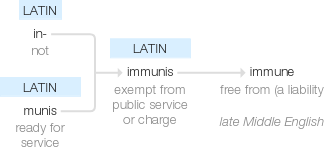Immune
late Middle English (in the sense ‘free from (a liability’)): from Latin immunis ‘exempt from public service or charge’, from in- ‘not’ + munis ‘ready for service’. Senses relating to physiological resistance date from the late 19th century.
wiktionary
From Middle English, from Middle French immun, from Latin immūnis(“exempt from public service”), from in-(“not”) + mūnus(“service”)
etymonline
immune (adj.)
mid-15c., "free, exempt" (from taxes, tithes, sin, etc.), from Latin immunis "exempt from public service, untaxed; unburdened, not tributary," literally "not paying a share," from assimilated form of in- "not, opposite of" (see in- (1)) + munis "performing services" (compare municipal), from PIE *moi-n-es-, suffixed form of root *mei- (1) "to change, go, move." Specific modern medical sense of "exempt (from a disease)," typically because of inoculation, is from 1881, a back-formation from immunity. Immune system attested by 1917.
